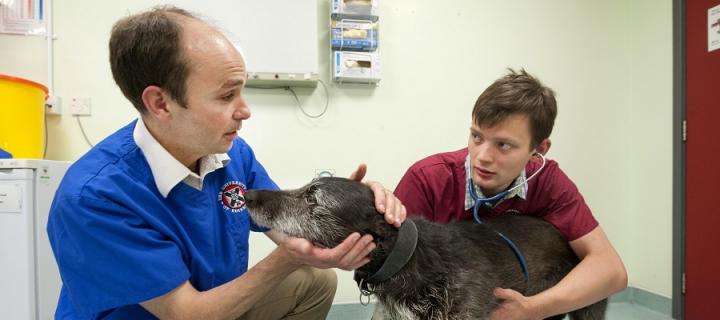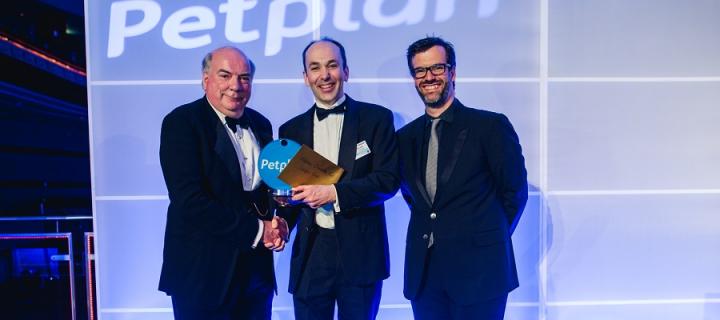Richard Mellanby and comparative medicine research
Richard Mellanby aims to advance understanding on how an inflammatory response develops and is restrained in companion, farm and wild animals.
What are you currently working on?

My basic science research programme investigates the factors involved in the initiation and resolution of inflammation. My work aims to advance understanding on how an inflammatory response develops and is restrained in companion, farm and wild animals.
I am particularly interested in understanding how nutritional status influences the development of an inflammatory response. This research programme is underpinned by mechanistic studies in experimental murine models and clinical trials in companion animals.
I am currently a Reader in Comparative Medicine and a Wellcome Trust Intermediate Clinical Fellow. During my current fellowship, I am examining the factors which antigen presenting cells (APCs) have to provide in order to drive an autopathogenic T cell response. A central theme of this work focusses on how vitamin D modulates the host immune response.
The effect of Vitamin D
I have demonstrated that vitamin D supplementation ameliorates the development of experimental autoimmune encephalomyelitis (EAE) when induced by the administration of an adjuvant and myelin autoantigens. In contrast, I have found that administration of vitamin D does not alter the development of active EAE which arises following the administration of ex-vivo activated myelin responsive T cells. Consequently, my work focusses on exploring how vitamin D modulates the initial priming of T cells.
I am particularly interested in how vitamin D modulates myeloid cell phenotype and function. I utilise a wide range of in-vitro assays and in-vivo models which I have developed over the past decade including a novel model of EAE in which central nervous system autoimmunity develops following the transfer of naïve auto-antigen responsive T cells and APCs loaded with a relevant peptide. This programme of work has been supported by three consecutive Wellcome Trust Fellowship Awards.
I am also leading population based epidemiological studies which are examining the relationship between vitamin D, inflammation and health outcomes in numerous animal populations. I run a parallel translational clinical vitamin D research programme which studies spontaneous vitamin D metabolism disorders in client owned companion animals.
What do you hope will come out of your research?

I hope that my research will improve the understanding of the biology of diseases which cause significant morbidity and mortality to both animals and humans. I hope that my work will lead to the development of better preventive and therapeutic approaches which improve the health of animals and humans.
A particularly important aim of my research is to harness the opportunities afforded by a ‘One Medicine’ approach. I believe that by improving our understanding of diseases in one species, this offers an opportunity to improve the health of other animals. Understanding diseases in client owned dogs is not only crucial to fulfil our aim of improving the health of millions of pet dogs, it also provides an opportunity to learn more about human diseases without the need to utilise imperfect experimental murine models.
How did you get here?
I graduated from University of Glasgow Veterinary School and after two years in small animal practice, I completed a 3 year residency in small animal medicine at the University of Cambridge. I was awarded the RCVS Certificate in Small Animal Medicine in 2001, the RCVS Diploma in Small Animal Medicine in 2003 and the ECVIM Diploma in Companion Animal medicine in 2004. I was then awarded a Wellcome Trust Clinical Training Fellowship to undertake studies into T cell activation and regulation in diabetes.
I was awarded a PhD in 2007 and then moved to the University of Edinburgh to work as a clinical fellow dividing my time between clinical work and research. I was awarded a second Wellcome Trust fellowship to continue my studies into T cell activation in 2008. I was appointed Head of Small Animal Medicine in 2011 and Head of Veterinary Clinical Research in 2012. In 2012 I was awarded a third Wellcome Trust fellowship to explore how antigen presentation cells activate a pathogenic T cell response. I am currently Head of Companion Animal Sciences.
Research interests grounded in clinical cases
My research interests are grounded in the clinical cases which I manage as a small animal medicine specialist. We routinely deal with patients that have debilitating metabolic and nutritional disorders. This fueled my early research interests which resulted in the validation of a range of biochemical tests that improved the ability of veterinarians to diagnose and treat metabolic diseases, notably disorders of calcium homeostasis. These assays have also allowed us to gain a deeper understanding of the relationship between vitamin D and health outcomes in numerous diseases.
Over recent years, I have developed an integrated research programme which links process to patient to population with a focus on exploring the relationship between vitamin D and non-skeletal health outcomes. My current research uses murine models to understand the effect of vitamin D on antigen presenting cells, veterinary patient based research to understand how systemic diseases alters vitamin D homeostasis and population based research to explore the relationship between vitamin D and long term health outcomes.
Who are you collaborating with?

One of the best features of any clinical scientist job is being able to meet and develop collaborations with a diverse range of clinicians, clinical scientists and basic scientists. Key collaborators at the Royal (Dick) School of Veterinary Studies include Ian Handel, who I work closely with on epidemiology studies, and Adam Gow, who is a senior lecturer in small animal medicine and is a key partner in my clinical studies.
I collaborate with numerous other scientists based in the QMRI, Kings Buildings, R(D)SVS and The Roslin Institute. My current role has also allowed me to develop national collaborative initiatives including a roadmap for postgraduate veterinary clinical scientist training which was supported by all UK veterinary schools.
Tell us something about you that might surprise us
Although there are very few Mellanbys (192 in 1911 census), several of us have enjoyed careers as clinical scientists. The most famous Mellanby scientist was Sir Edward Mellanby who, like myself, was born in Hartlepool and spent time training at the University of Cambridge.
Similar to Sir John Savill, Sir Edward occupied a key leadership position in the Medical Research Council. He was secretary of the MRC between 1933 and 1949 and became an FRS in 1925 before being knighted in 1937. Bizarrely, his line of research was very close to my own as he published the seminal observation that cod liver oil prevented rickets in dogs in 1919. The protective agent was later found to be vitamin D.
Related Links
The Royal (Dick) School of Veterinary Studies
Richard's research profile on The Roslin Institute website

